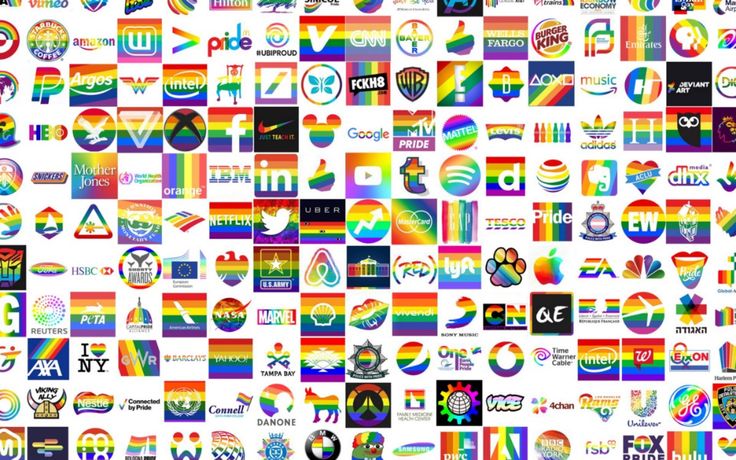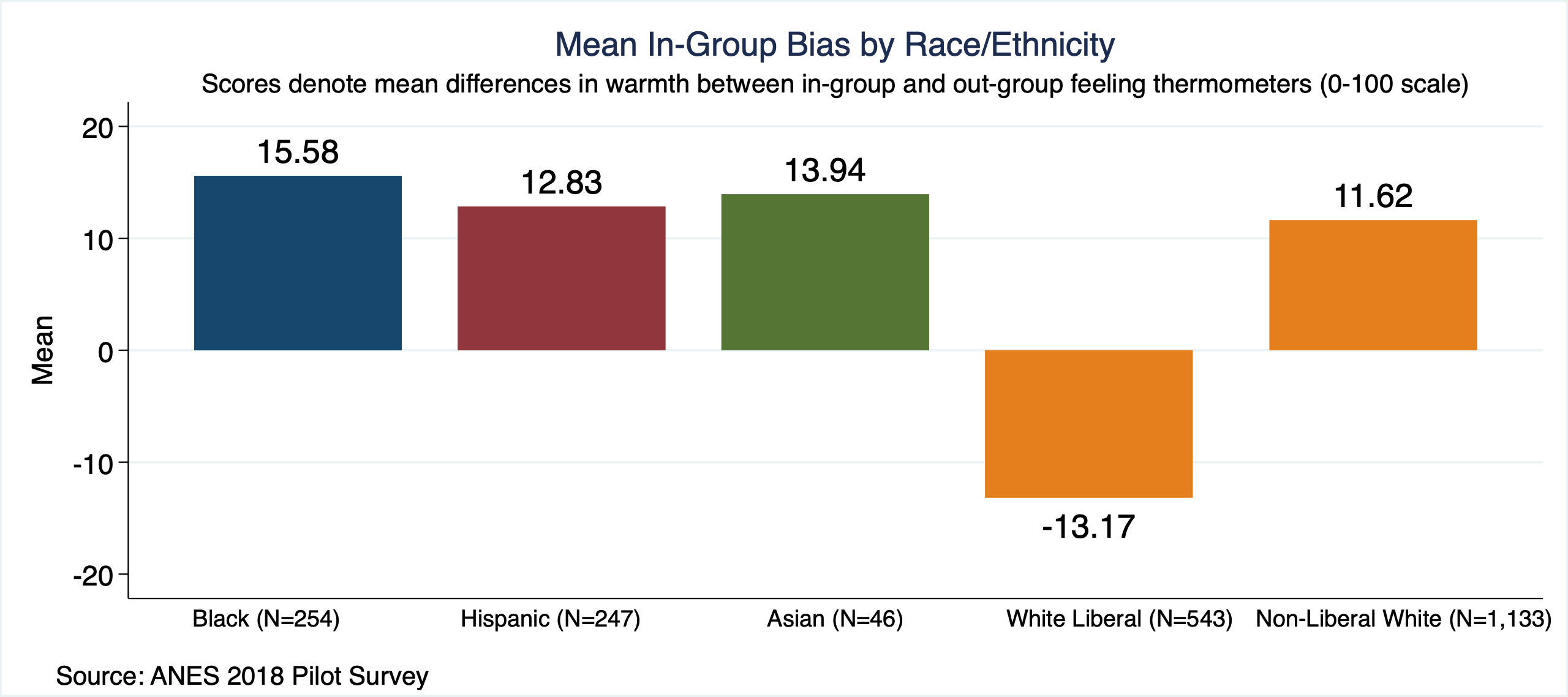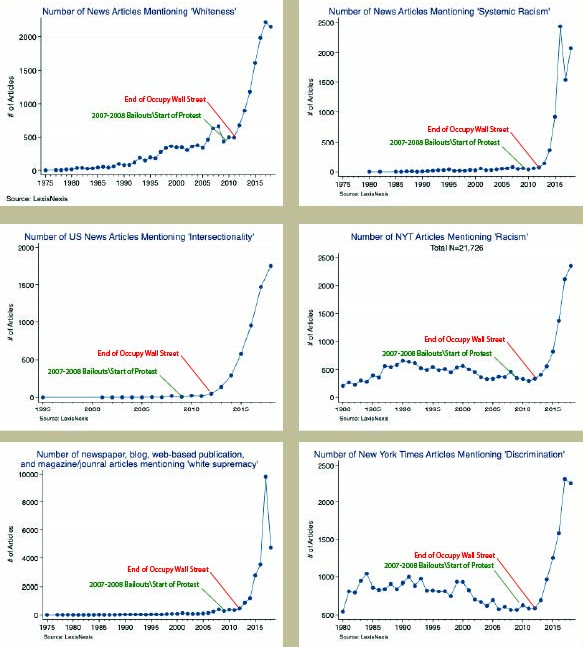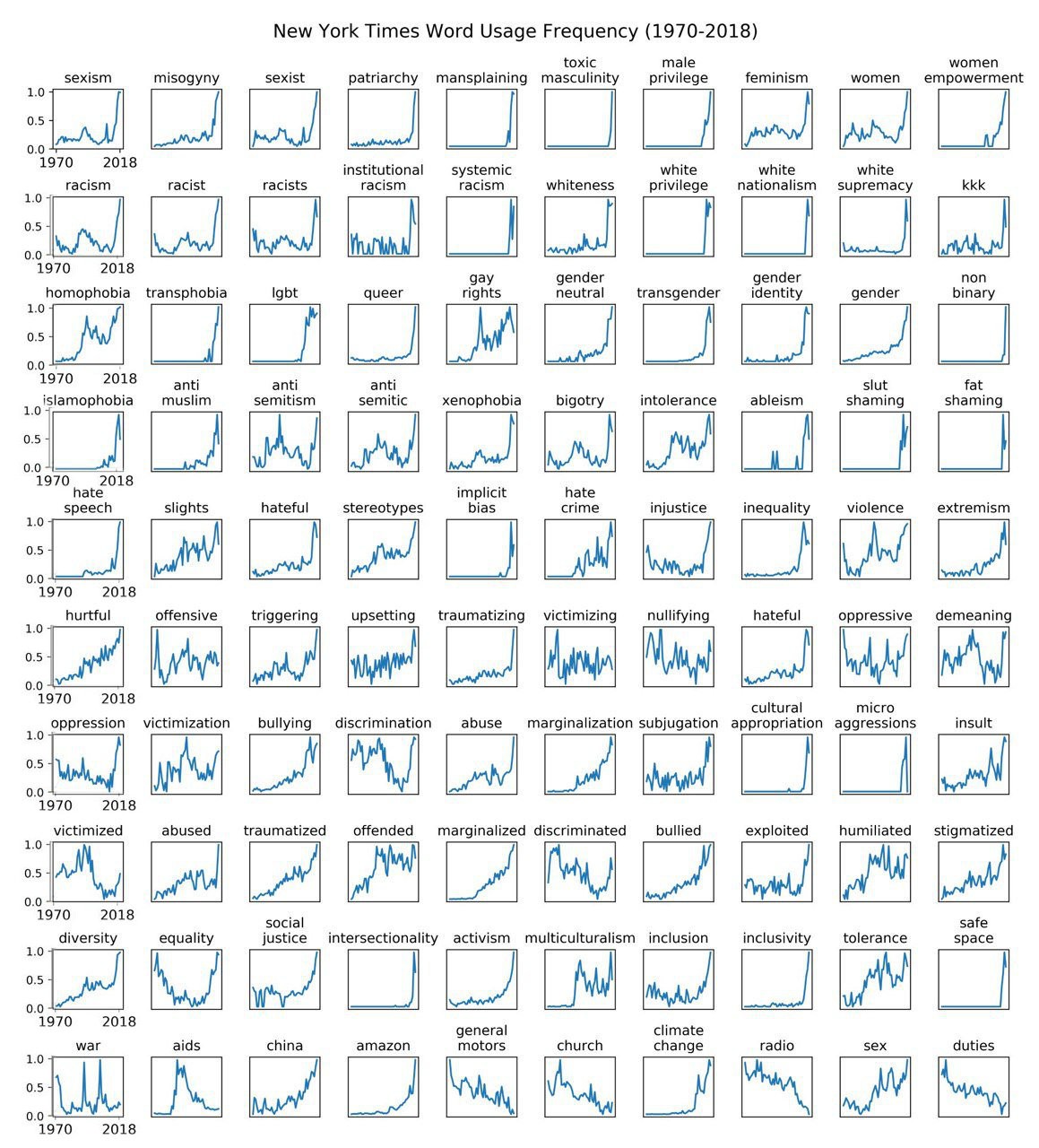Explaining Woke Capitalism
It is rare in such a chaotic and divided world to see any consensus as strong as that which large corporations have for LGBT, racial, body positivist, and generally "woke" activism. The constant presence of this woke activism in nearly every aspect of our lives makes it impossible to ignore, and its obvious artificiality makes us ask "Why is every company woke?".

Some might tell you that companies are filling their advertisements with diverse people in order to market themselves to new and diverse demographics, that its a natural strategy considering the increasingly diverse state of society. Those who don't find the marketing approach convincing might naturally conclude that companies are just ideologically motivated and want to force their personal beliefs onto the rest of us, even at the cost of their brand's reputation and marketing budget.
For a few companies these more superficial explanations are sufficient to explain their behavior, but neither of these ideas can explain the near universal consensus that corporations have for this kind of activism.
This woke activism trend among big corporations extends well beyond the marketing material that most of us regularly see and designate as the extent of corporate wokeness. Their inside operations and charity donations always make sure to include woke activism as well. Which contradicts the idea that companies do it for purely marketing reasons. Anyone who has worked for Amazon can tell you about their diversity training programs for employees and their hiring policy requiring them to seek out minority groups to fill job positions. Many large corporations have a webpage similar to the amazon diversity and inclusion page which outlines their various woke policies conveniently for you, feel free to look up your favorite company's website and see what you find.
There is something at a systemic level which causes these companies to behave in this way, some incentives which make them do it. Without some systemic incentives such a universal consensus among these companies would be impossible. This article will cover 3 major categories of those incentives.
* ESG Scores
* Labor Union Prevention
* Preventing Anti-Corporate Activism
We'll start with the first one, which is probably the biggest of them all but is also unknown to the average person who doesn't educate themselves about the detailed operations of international finance.
~ ESG Scores ~
ESG stands for "Environmental, Social, Governance". Those would be the 3 categories of interest for ESG investing which is a stakeholder approach which aims to invest money in a "socially responsible" manner. It favors investing in companies which are environmentally friendly, socially progressive, and governed transparently and in such as way as to reduce conflicts of interest. These traits are said to be indicative of a more "sustainable" investment. Most important to note here is the "Social" area of interest which favors socially progressive practices such as diversity and inclusion, this is the source of our corporate wokeness as it relates to ESG.
Many prominent financial organizations have adopted ESG as a primary part of their investment strategy. BlackRock is the world's largest hedge fund, currently managing over 10 trillion dollars worth of assets. It is an industry leader when it comes to ESG investing, and has set the trend which dozens of other massive financial entities have followed. You can blame BlackRock's CEO Larry Fink for that one. He sits on the board of the World Economic Forum, the organization responsible for the infamous "You'll own nothing and be happy" video as well as pursuing the idea of "The Great Reset". He is one of the most important characters when it comes to popularizing ESG investing. His annual letter to CEOs and shareholders outlines how he intends to convince companies under BlackRock's influence to practice ESG.
ESG Scores are assigned to various companies by rating agencies within massive financial entities such as Bloomberg, Dow Jones, Thomson Reuters, and more. Think of an ESG score like your credit score in the sense that it allows you better access to the financial system the higher it is. As a company you want to increase your ESG score in order to get hedge fund investment, to reduce your insurance rates, and reduce other costs associated with doing business. In general, financial entities will treat your business better the higher your ESG score is.
ESG scoring tries to favor quantitative results over box-ticking. For example, it is beneficial to say that you support the LGBT community but it is even better to do something quantifiable such as put out marketing material featuring real LGBT people, to actually hire LGBT people at a high rate and place them in high positions in the business, and to donate to LGBT charities. This applies to other minority groups as well. Policies such as this would increase your company's ESG score through the "Social" area of interest.
The seemingly unexplainable connection between environmentalism and social progressivism in modern politics is easily understood when you frame it as a result of the prevalence of ESG. It arbitrarily combines these two entirely distinct topics into the same score, so the association between the two is unavoidable even though they aren't really related topics on their own. Organizations which practice ESG spread that influence into the common political discourse, which creates the pointless association between environmentalism and social progressivism which otherwise would have little reason to exist.
This grouping of different subjects into a single score allows companies to obtain a decent score for the finance benefits while also continuing to be an undeniably evil company. As an example, a company could mistreat its employees, as Amazon is infamous for. Then all it has to do is donate a lot of money to social activism, enforce a diverse hiring policy, and plant some trees somewhere. Now this company can reap the benefits of an acceptable ESG score without really improving on what matters. In the real world no one would be convinced that you can make up for employee abuse by planting some trees, but in the world of ESG the scoring system can be exploited like that.
The growth of woke activism correlates with the increasing adoption of ESG by international finance following the 2007 financial crisis where BlackRock was contracted by the Federal Reserve to oversee and advise the distribution of economic stimuli. This contract shot BlackRock and its ESG policies into a position of huge economic influence throughout the following decade. So the reason that many companies became woke in the last 10 years is simply because they are financially competent and know that having a high ESG score benefits them greatly in this economic system.
The point of origin for the wokeness of massive corporations is only a few hedge fund managers and financial organizations who chose to adopt ESG because they were convinced by earlier Stakeholder Theory decades ago. This early stakeholder ideology argued that companies have a responsibility to treat not only their investors but also their employees and the environment around them nicely. It doesn't sound like such a terrible idea on the surface but when its core concept of emphasizing inclusion for all possible stakeholders is allowed to grow and develop on itself you inevitably get the hyperinclusive ESG system and all the woke victimary rhetoric that comes with it.
Note the key players in the creation and popularization of stakeholder theory, such as Klaus Schwab and Larry Fink, are members of the World Economic Forum. If you want to blame one think tank for a lot of the world's problems this could be the one. They are very organized, ideologically motivated, and powerful enough to force the world around them to participate in their corrupt system.
~ Labor Union Prevention ~
This next one is very simple compared to ESG. Companies have an incentive to prevent labor unions from forming because labor unions are expensive and convoluted to interact with. They influence worker's wages and force the company to make all sorts of inconvenient accomodations for employees. Companies exploit wokeness as part of a psychological operation to prevent unionization.
Amazon, being our standard example of a very competent and massive corporation, can show us exactly how to use wokeness to prevent unions. In 2020 documents were leaked showing that Amazon had been tracking its employee demographics and concluded that more racially diverse work environments were less likely to unionize. See this article. Indicating that part of the reason for their diverse hiring policy is that it reduces the risk of unionization. Amazon has a reason to be one of the most competent when it comes to preventing labor unions because their history of employee abuse makes those employees more likely to pursue unionization than most others.
This can be understood in psychological terms, the concept of in-group bias demonstrates how ethnic groups usually favor themselves over other groups. 
In a racially diverse work environment unionization is less likely simply because the employees have less social cohesion and trust as a result of working with others who don't belong to their in-group. Lower social cohesion and trust means the workers are less likely to consider coordinating with each other to form a union.
Regardless of your opinion on labor unions you should be able to see how the incentive to prevent them results in companies practicing diverse hiring policies. They then justify these hiring policies using dishonest woke rhetoric. But the leaked documents prove that the rhetoric and ethics don't matter to them and the actual reason for their policy is their own self interest.
What Amazon is doing with its diversity policy also proves statistically that multiculturalism and diversity in general make for very poor social environments. If diversity statistically reduces social cohesion and trust in a workplace context we can reasonably conclude that it isn't good for society as a whole either.
~ Preventing Anti-Corporate Activism ~
This theory will have to be much more speculative than the other two but it is still based on statistical facts, reports from involved parties, and an understanding of incentives.
In 2011 a protest erupted in Zuccotti Park, in New York City's infamous Wall Street. It would become known as Occupy Wall Street. Occupy Wall Street (OWS) formed out of frustrations surrounding the corporate bailouts provided by the government during the 2008 recession. The protests originally focused on pointing out greed, corruption, and the severe and unnatural economic inequality resulting from them.
OWS fell apart very quickly, due in large part to division, poor organization, and lack of consensus within its leadership. After the protests some heavily redacted FBI documents were released which show that cooperation between the US government and wall street corporations was happening regarding OWS, likely with the intent to manage and end the protests as soon as possible. These documents as well as convenient summaries can be viewed here. Obviously a corporation would have every incentive to cooperate with the government to end a protest like this because it is simply very uncomfortable to have protesters at your door.
Subversive law enforcement infiltration of OWS was also reported by many OWS organizers such as Kevin Zeese, organizer of the Washington DC branch of OWS in this article
The very sudden collapse of OWS, the verifiable proof of FBI surveillance of the movement, strong corporate involvement in said surveillance, and reports of law enforcement infiltration all lead naturally to the conclusion that OWS leadership was possibly subverted by the collaborative efforts of corporate america and the US government to serve the interests of the corporations which were under pressure from the protests. The US government and these companies also have a recent history of cooperation during the great recession bailouts so it isn't out of the question for them to cooperate again shortly after to prevent protests from criticizing said bailouts.
The disorganized leadership of OWS is largely to blame for the movement's failure, poor organization can destroy any event no matter how motivated the participants are to keep it going. The details of this leadership failure are where theories involving woke capitalism start to form.
The Progressive Stack is a technique used in event organization to give increased influence to smaller "marginalized groups", as opposed to just letting the majority rule. It works by giving marginalized groups higher priority when it comes to delivering speeches and making leadership decisions. This technique was practiced by several divisions of OWS (as seen here). This technique has received a lot of criticism because its focus on empowering marginalized groups results in much discussion about the nature of that marginalization instead of discussion about the event's stated goals. See this video as an example. The progressive stack is a massive organization obstacle and distractive force which undermines the effectiveness of an otherwise respectable operation.
The progressive stack is extremely suspicious because of its resemblance to FBI COINTELPRO tactics meant to "discredit, disrupt and negatively redirect action." The FBI would infiltrate the leadership of many political organizations during COINTELPRO and propose policies meant to distract and misdirect the organization's efforts. This resemblance is further evidence of a subversive force within OWS which intended to redirect its efforts away from the attack on corporate america and towards discussions of race, gender, LGBTs, and general wokeness. A protest about economic corruption was crippled by the influence of woke politics, which in any sane and natural environment would be entirely unrelated topics not subject to influence each other.
While there is no inarguable proof of the wokeness being an intentionally subversive idea planted within OWS by the US government and Wall Street, the means, incentives and precedents for such an operation are certainly there so it's at least a likely explanation for the collapse of OWS considering all of the evidence. Even if it wasn't a planned tactic it certainly did end up benefitting the interests of corporate america, which makes the activity of corporate america following the collapse of OWS worthy of analysis.
During and following the collapse of OWS there was very sudden spontaneous consensus from corporate america and the media regarding wokeness, seemingly in an effort to avoid more class-based protests. Personal experience and the following statistics can testify that corporate wokeness really took off in the decade from 2010 to 2020. Corporate america played into the woke agenda in order to maintain the distraction from class politics. This is done because class politics is threatening to corporate america, while woke politics isn't.

~ Conclusion ~
Corporate wokeness exists just to serve the interests of corporations. Any competent corporation would want a high ESG score, would want to prevent their employees from unionizing and would want to prevent class-based protests from erupting outside their headquarters. Wokeness has been found to serve all of these ends and more and that's why every company is going woke. While there are some elements of ideology at play here, the largest reason why corporations have gone woke is simply because it is in their best amoral interests on multiple fronts at this time. There are also other reasons for corporate wokeness not discussed here, such as the strategy of using second and third world immigration to inflate the labor market and reduce wages, saving corporations money. But it would be challenging to cover every possible economic incentive like that in one article.
The environment these corporations are operating within is deeply systemically flawed and has created the incentives that cause this behavior. Understanding that environment is key to creatively realizing a solution, hopefully this article has helped with that.

